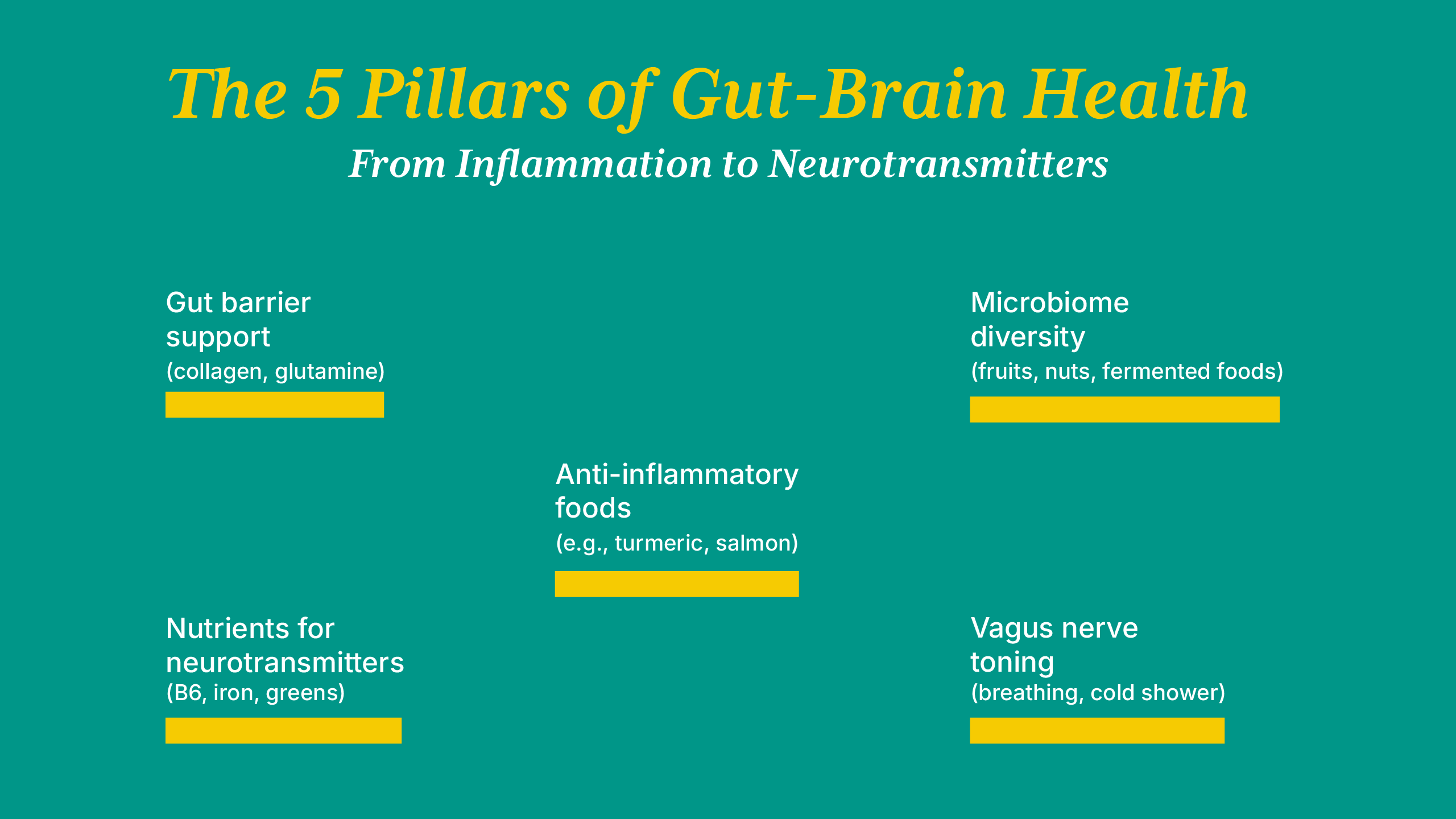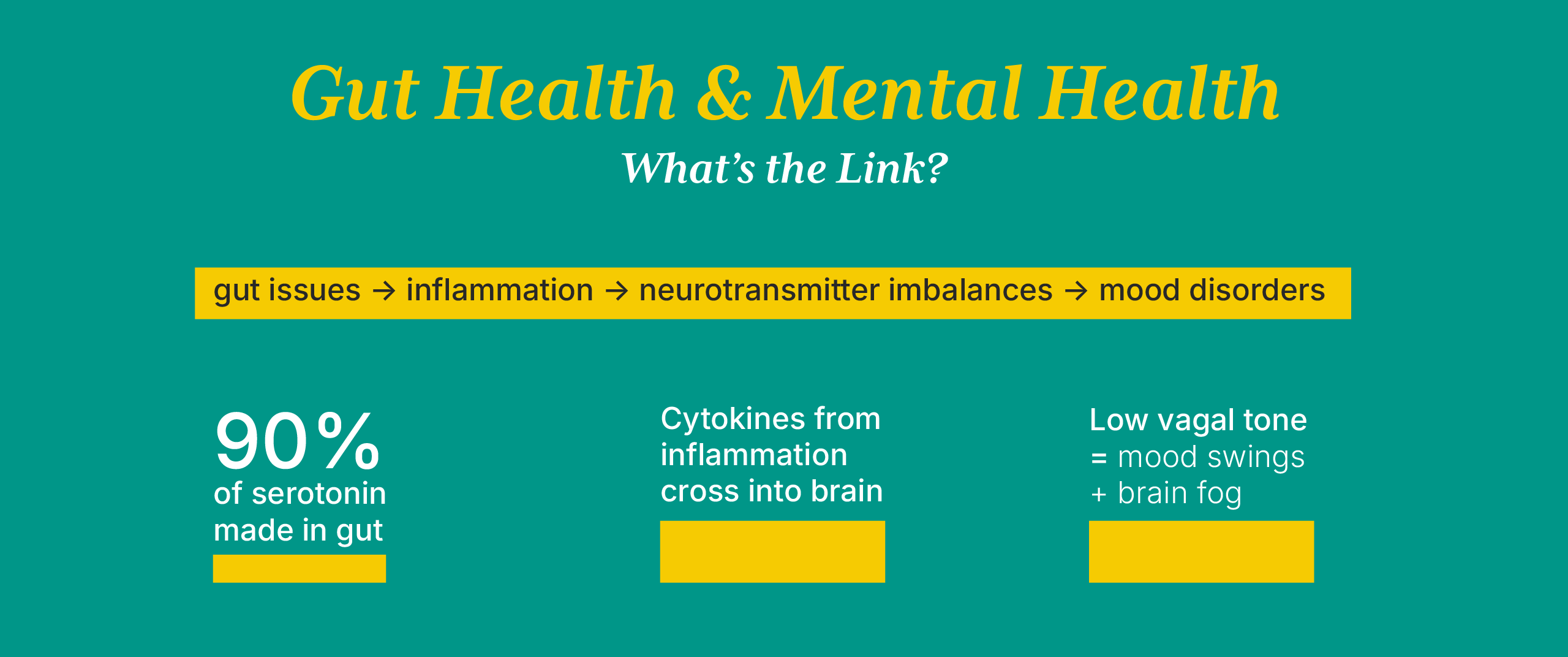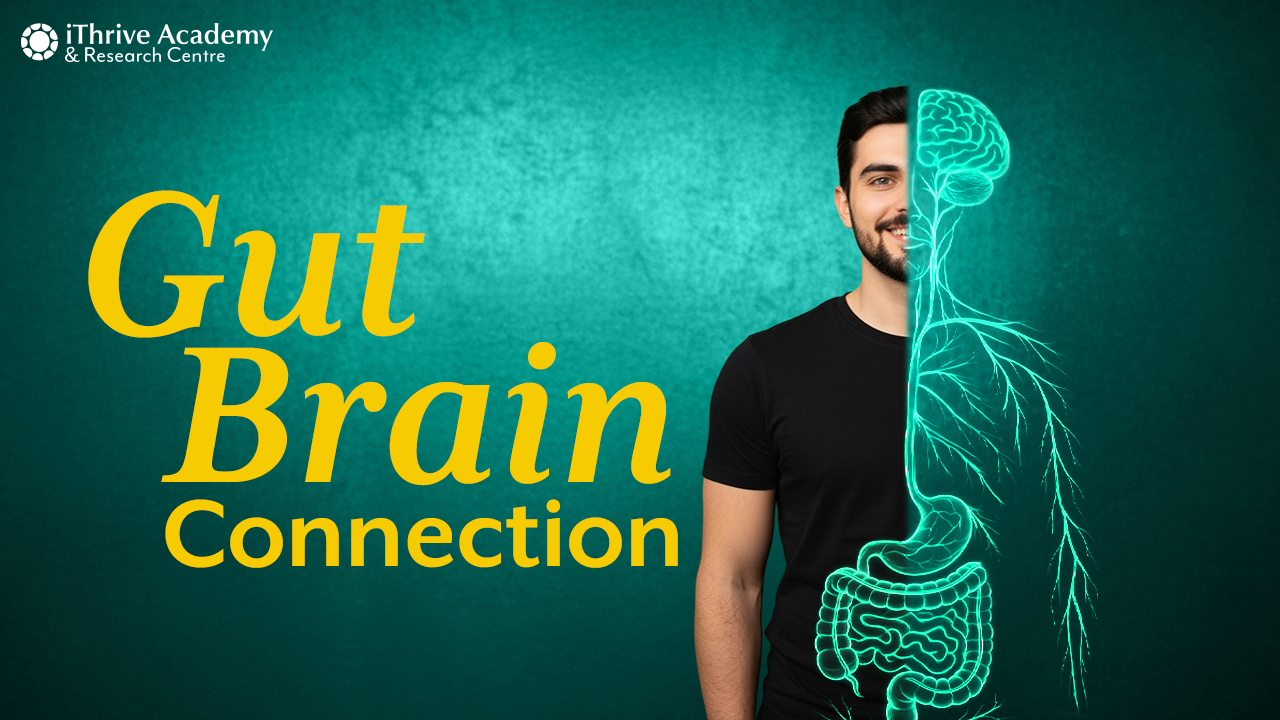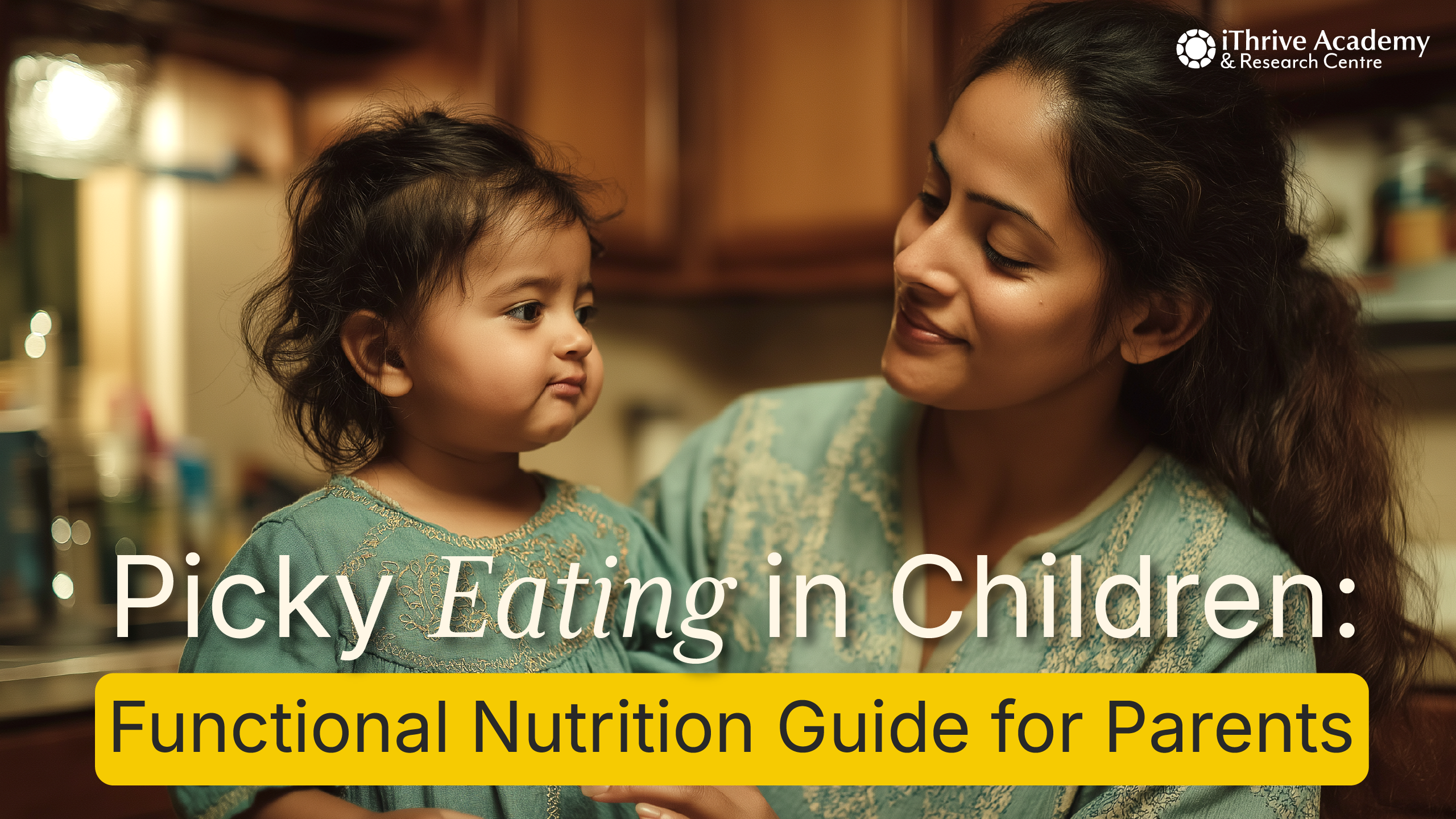Your stomach talks to your head all day long, sometimes in polite whispers, sometimes in panicked shouts. Science calls this conversation the gut brain connection or gut brain axis, and it explains why a bad meal can turn into a bad mood or why chronic stress can feel like knots in your belly. In functional medicine we view the gut lining, the immune system, resident microbes, and your nervous system as one integrated network. Strengthening that network is the fastest way to upgrade both digestion and focus, energy and ease.
Below you’ll find five evidence‑based pillars that will clarify how the gut affects the brain and what you can do right now to restore balance.
Reduce & Resolve Inflammation

Pillar 1 - Quiet Chronic Inflammation
Low‑grade gut inflammation is like background static that drowns out clear signals between the gut and brain. Diets heavy in refined oils, gluten, dairy, hidden food sensitivities, or ongoing infections raise cytokines that pass the blood–brain barrier, sparking mental fatigue and irritability, 2 common gut brain connection symptoms.
Action plan: Focus on an anti-inflammatory diet rich in omega-3s from fatty fish like salmon and sardines, free-range eggs alongside leafy greens. Incorporate anti-inflammatory nutrients such as turmeric, ginger, and fresh herbs. Consider advanced testing, like the GI‑MAP, to identify hidden gut-related triggers.
Pillar 2 - Repair the Gut Barrier
A porous gut lining called “leaky gut” lets bacterial fragments drift into the bloodstream, tripping alarms throughout the nervous system and driving gut brain connection anxiety. Nutrients such as zinc‑l‑carnosine, glutamine, and collagen peptides help seal tight junctions, while few fermented foods supply post‑biotic compounds that reinforce the mucous layer. Think of it as fixing the walls before decorating the house.

Nourish the Microbiome & Brain Chemistry
Pillar 3 - Diversify the Microbiome
Your trillions of gut microbes act like tiny biochemical factories, churning out serotonin, dopamine, and short‑chain fatty acids that soothe both gut and mental health. Diversity is the secret sauce: aim for different nutrients weekly, everything counts, from herbs to nuts. Studies show greater microbial variety is linked to lower anxiety scores and sharper focus.
Pillar 4 - Fuel Neurotransmitter Pathways
Ninety percent of serotonin and over half of dopamine metabolites originate in the gut. These pathways require vitamin B6, magnesium, folate, iron, and quality protein. Include seeds, legumes, free-range eggs, and leafy greens at each meal, and consider an RBC‑minerals panel to spot hidden gaps. When neurotransmitters flow, the gut brain health circuit sparks clearer thinking and steadier moods.
Fine‑Tune the Signal Highway
Pillar 5 - Tone the Vagus Nerve
The vagus nerve is the biological fibre‑optic cable linking gut sensations to emotional centres in the brain. Low vagal tone often measured by poor heart‑rate variability leads to constipation, shallow breathing, and mood volatility. Simple daily practices such as 4‑7‑8 breathing, humming, and cold showers improve vagal tone, smoothing communication along the gut‑brain axis and reducing runaway stress responses.
How iThrive’s Flagship Course Turns Knowledge into Practice
The gut-brain connection isn’t just a theory, it’s a clinically relevant system that requires structured understanding and application. That’s exactly what the iThrive Certified Functional Nutrition course delivers.
This flagship program is designed for health professionals and passionate learners who want to go beyond symptom-chasing and address the root causes of dysfunction, including imbalances across the gut-brain axis. Here’s how the course brings the 5 pillars into real-life practice:
Module: Gut Health From a Functional Nutrition Lens
Learn how to assess and support gut lining integrity, microbial balance, and inflammatory drivers with targeted nutrition and lifestyle. Directly supports Pillars 1–3.
Module: Mental Health, the Nervous System & Functional Nutrition
Explores the biochemical roots of anxiety, low mood, and poor cognition, all linked to gut-brain signaling. Supports Pillars 4–5.
Module: Functional Blood Chemistry Analysis
Teaches how to interpret blood markers to catch nutrient deficiencies affecting neurotransmitter pathways before they show up on symptom scales.
Module: Functional Nutrients and Dietary Supplements
Covers nutrients like B-vitamins, magnesium, and amino acids that directly fuel the production of GABA, serotonin, and dopamine, central to Pillar 4.
Module: Functional Movement & EMF Awareness
Introduces simple somatic strategies and lifestyle changes like vagal nerve activation and digital detox to restore balance to the gut-brain communication channels.
iCFN doesn’t just teach it equips you with lab analysis, case studies, food-as-medicine frameworks, and clinical protocols to confidently address gut and mental health concerns in your clients or yourself.
If you're serious about transforming theory into practice, iCFN is the place to start.
Practical Daily Tips & Recommendations

Morning mineral elixir: warm water, ½ lemon juice, pinch of sea salt, primes digestion and provides electrolytes for neural signalling.
Pre‑meal breathing: Two minutes of slow nasal breathing before you eat flips the switch to parasympathetic mode, improving motility and enzyme output.
Movement micro‑breaks: Five minutes of brisk walk every hour keeps lymph moving, speeding the removal of inflammatory by‑products.
Cold splash ritual: End showers with 30 seconds of cool water to stimulate the vagus nerve, quick, free, remarkably effective.
Final Thoughts
A thriving gut brain connection isn’t a luxury, it’s the biological foundation for vitality, resilience, and clear thought. By calming inflammation, sealing the gut barrier, diversifying microbes, feeding neurotransmitter pathways, and tuning the vagus nerve, you create conditions where body and mind work in harmony. If you’re ready for step‑by‑step guidance, concept clearance, knowledge upgradation, and a supportive community, the iThrive flagship course stands ready to turn these pillars into everyday practice. Your gut talks to your brain 24 / 7, make sure it has something good to say.









.jpg)











